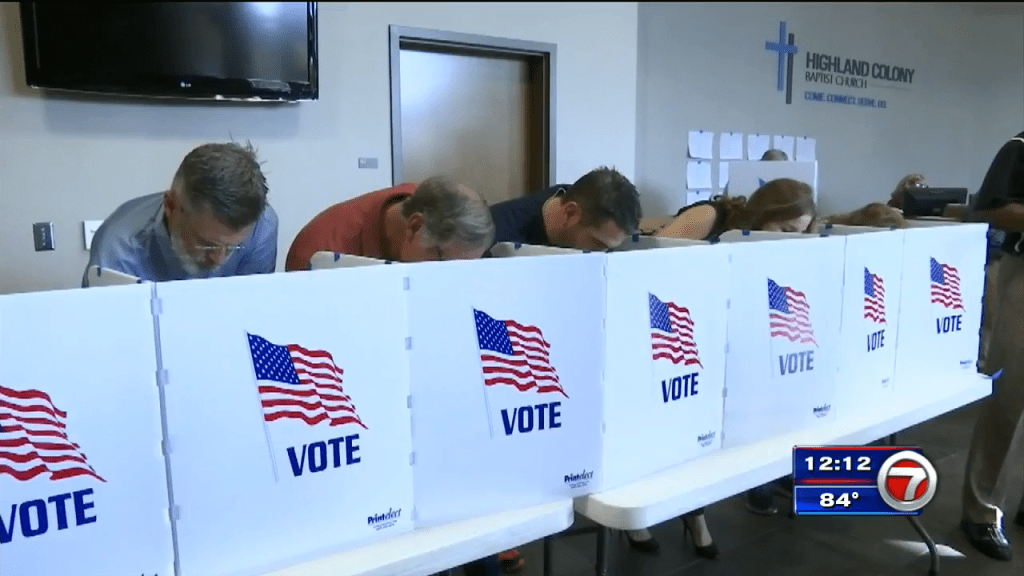TALLAHASSEE, Fla. (AP) — The Florida Supreme Court began considering Wednesday whether a voter-approved constitutional amendment restoring the voting rights of felons who complete their sentences means they also have to pay court-ordered fines, fees and restitution.
Republican Gov. Ron DeSantis believes that’s the case and signed a Republican-sponsored bill requiring legal financial obligations be met before voting rights are restored. But he asked the court to clarify the amendment after advocates for felons sued in federal court. Their lawsuit claims that denying the right to vote to those who can’t afford to pay fees, fines and restitution amounts to a poll tax, which violates the U.S. Constitution.
The debate revolves around language in the amendment and on last November’s ballot that says felons will have their rights restored “after they complete all terms of their sentence including parole or probation.”
“All terms means all of the conditions that are in the sentencing order,” said Joseph Jacquot, a lawyer for DeSantis.
Lawyers for the American Civil Liberties Union and for felons represented in the case argued that terms could be defined as the duration of a prison term, and not all conditions spelled out in a judge’s sentencing order. They also said that once a felon does all his time and probation, any fees, fines and restitution are converted to a civil lien, and are no longer part of the criminal sentence.
Placing financial requirements on the right to vote violates the U.S. Constitution, they said.
ACLU lawyer Anton Marino asked the court to find the amendment “does not require repayment of all legal financial obligations, because doing so would mean that every person unable to pay is serving a life sentence.”
The ACLU estimates that if voting rights aren’t conditioned on these legal financial obligations, then 1.4 million felons would become eligible to cast ballots. But it estimates that only 20 percent of that population would be eligible for restoration if the financial restrictions are imposed.
Justice Ricky Polston pointed out that the court isn’t ruling on the constitutionality of the law, but rather the definition of what a sentence includes.
“Whether the whole thing goes, or whether pieces of it stay, all those things would yet to be sorted out down the road, but it’s not before us right now,” he said.
But justices did seem more sympathetic to the governor’s arguments, saying repeatedly that advocates for restoring felons’ voting rights said before the election that legal financial obligations were part of a sentence.
“If I say I’m sentencing you to five years in state prison, $5,000 of restitution, a $2,000 fine and court costs in the amount of $973, what are the conditions of that sentence?” Justice Alan Lawson asked Marino. “What are all conditions of that sentence?”
Marino said there is a difference between terms and conditions, and the terms would be time spent in prison and completion of probation.
Justice Barbara Lagoa cut off Marino’s answer.
“Are you suggesting that … the trial court just ordered $5,000 of restitution to the victim, that that is not a term of sentence? Because that would be new to me under Florida law,” Lagoa said.
The issue is also before a federal judge considering a lawsuit involving the same parties. Last month U.S. District Judge Robert Hinkle temporarily blocked the law implementing the amendment, saying the inability to pay raises federal constitutional issues.
Whether the legal questions are settled before Florida votes in the presidential election remains to be seen. The federal case is set for trial in April, after Florida’s March 17 presidential primary. The deadline to register for the November election is Oct. 5, 2020. Florida’s 29 electoral college votes are considered a key in determining whether President Donald Trump is re-elected.
Copyright 2024 The Associated Press. All rights reserved. This material may not be published, broadcast, rewritten or redistributed.

